Soil microbiome: The soil microbiome is a key driver for nutrient turnover, plant growth promotion, carbon sequestration and safeguarding of drinking water resources. We investigate consequences of climate change and land use intensity on the soil microbiome of pre-alpine grass land soils. Our data indicates:
- Independent from the land use intensity, stronger shifts in climate change induce more significant changes in the structure and function of the soil microbiome.
- Consequences of climate change for extensively and intensively managed grassland soils are differing already after a short period of climate change simulation:
- At extensively managed sites a reduction in the abundance of P mineralizing bacteria and bacteria with strong P uptake systems together with an increase in N mineralizing bacteria was observed
- At intensively managed sites the abundance of bacteria involved in P mineralization was increased, whereas in the abundance of nitrogen fixing and ammonia oxidizing bacteria was reduced
- Our data indicates long term consequences for the stoichiometry of nutrients in soil which might be contrasting in sites under different management:
- At extensively managed sites, P will become a limiting factor due to an increased N:P ratio on the long term.
- At intensively managed sites, N will become a limiting factor due to a smaller N:P ratio on the long term.
- Thus, future management strategies might differ depending on the intensity of management


